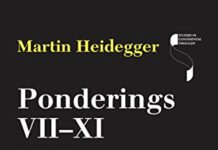
Ebook Info
- Published: 2010
- Number of pages: 233 pages
- Format: PDF
- File Size: 2.10 MB
- Authors: Martin Heidegger
Description
First published in German in 1995, volume 77 of Heidegger’s Complete Works consists of three imaginary conversations written as World War II was coming to an end. Composed at a crucial moment in history and in Heidegger’s own thinking, these conversations present meditations on science and technology; the devastation of nature, the war, and evil; and the possibility of release from representational thinking into a more authentic relation with being and the world. The first conversation involves a scientist, a scholar, and a guide walking together on a country path; the second takes place between a teacher and a tower-warden, and the third features a younger man and an older man in a prisoner-of-war camp in Russia, where Heidegger’s two sons were missing in action. Unique because of their conversational style, the lucid and precise translation of these texts offers insight into the issues that engaged Heidegger’s wartime and postwar thinking.
User’s Reviews
Reviews from Amazon users which were colected at the time this book was published on the website:
⭐Written in the mid-1940s (but published posthumously), these three “conversations” provide a unique perspective on Heidegger’s critique of technology and his development of “releasement” as its counterpoint. Other treatments, such as The Question Concerning Technology and Discourse on Thinking (both written about 10 years later) are more or less traditional lectures or philosophical essays, while these are presented as conversations among participants who, like the reader, are trying to follow the tortuous path of Heidegger’s later thinking.The first conversation, among a physicist, a scholar, and a “guide”, leads through some familiar late-Heidegger themes — the limits of representational thought (and language), subject-object metaphysics, the dependence of modern science upon the technological world-view, and his emerging way of speaking about what he believes has been covered up by these prevalent ways of living in and making the world understandable.It’s the last of those themes that I think is most distinctive in this and in the other two conversations as well. Heidegger develops more clearly, for me at least, a sense of why the traditional methods of philosophy — precisely stated propositions methodically constructed and argued for — fail to provide what he needs to articulate his later thinking. What he means to do is to point, to lead by speaking, or “surmising”, to a thoroughly different, and for him more primordial way of having a world. Even phrases like “having a world” fail because they inevitably conjure elements of exactly the metaphysics he means to call into question and counter. The difficulty of his own language — terms like “regioning”, “non-willing”, “releasement”, “unconcealing” , “waiting” — is that we are compelled to fit what he is saying back into the very metaphysics and the very understanding of language that he is opposing.Also in that first conversation is a consistent thread about willing in its relationship to technology and the understanding of the world as a world of objects over against a subject. Here Heidegger espouses “non-willing” as a releasing of this kind of demand toward the world that it offer itself up for human understanding and use.The final conversation, between an “older man” and a “younger man” in a Russian prisoner of war camp, provides some relatively rare discussion of how Heidegger saw the war itself within the dangers of technology, expanding on some enigmatic remarks in Discourse on Thinking about a danger greater than weapons of self-annihilation. Here Heidegger is clear and explicit in his claims that the very ideals of modern life — the securing of a high standard of living for all through modern technology and what we would now call the life of consumption — represents the triumph of a devastating forgetfulness of the more primordial relationship to being, to the world, that he is trying to remind us of and bring us back to.In the end, I think what we get out of these conversations is a sense of speaking or conversing as a way of coming to recognize, without the kind of propositional clarity we long for, the direction in which Heidegger is taking us and what he means by “releasement”. The metaphor of the country path is apt, in that Heidegger certainly doesn’t take us to a sure destination but rather only farther along a path.No one should be misled into thinking that, because these three writings are presented as “conversations”, they will flow more easily or be more easily comprehended than Heidegger’s other later writings. These conversations are difficult to follow.
⭐This was a great book and I loved it. Got it for someone as a gift and they seem happy.
⭐To avoid confusion, this is a translation of three essays, a part of the first of which was previously translated in “Discourse on Thinking” a long time ago. It is essential reading for Heideggereans, especially those interested in the concept of Gelassenheit (releasement) — the earlier partial translation unleashed a whole torrent of commentary and theorizing (note that Davis has another fine book about H getting to this topic).Like all this phase of Heidegger’s writings, one is baffled by the fact that Heidegger’s understanding of the modernist project and the dynamics of the modern understanding of the human being (the controlling, willing, technologically driven all pervasive ethos of this epoch) is second to none, and yet he was such a bastard. It poisons, vitiates the whole plausibility of his critique, a critique which is so necessary — if he believes all this, then there must be something wrong with it, he was so misguided, and yet…. he’s like a slightly bent key in a lock: fits smoothly, but jams when you try and open it. If ever there was somebody who was in the way of the Way, he’s it. He’s sort of like the last temptation, the one closest to the truth who is the most dangerous and the furthest away. These essays are all like that. Maddening.
⭐hopelessly wrapped up in the german language and its metaphors …,
⭐É um dos mais metafóricos livros escritos por Heidegger que vale a pena ler e saborear as lições do “guia” e de ver os passos de como se caminha em direção à abertura e simplicidade do “pensar à la Heidegger”!
⭐
Keywords
Free Download Country Path Conversations (Studies in Continental Thought) in PDF format
Country Path Conversations (Studies in Continental Thought) PDF Free Download
Download Country Path Conversations (Studies in Continental Thought) 2010 PDF Free
Country Path Conversations (Studies in Continental Thought) 2010 PDF Free Download
Download Country Path Conversations (Studies in Continental Thought) PDF
Free Download Ebook Country Path Conversations (Studies in Continental Thought)




